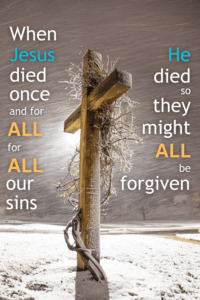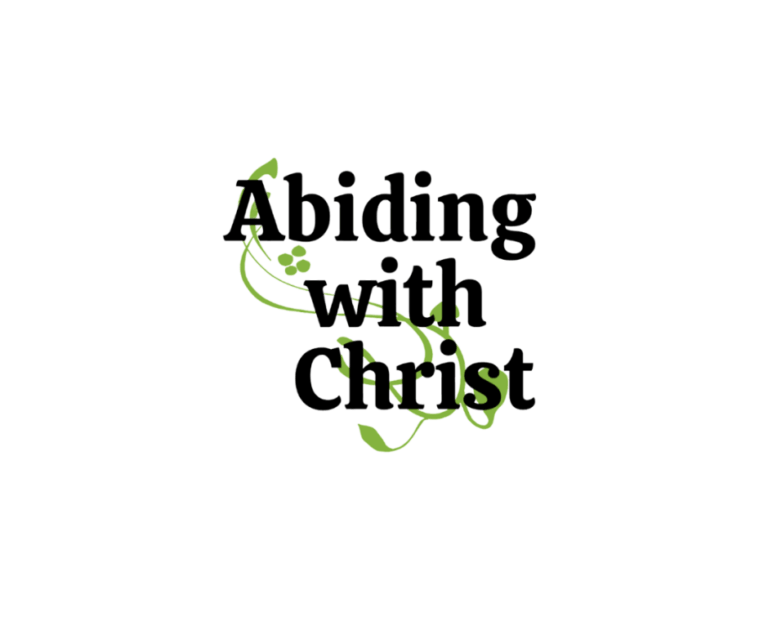The blessing of Christ’s once for all sacrifice is that our sins can always be covered by the blood of Jesus Christ.
Under the old covenant, the priest stands and ministers before the altar day after day, offering the same sacrifices again and again, which can never take away sins. But our High Priest offered himself to God as a single sacrifice for sins, good for all time. Then he sat down in the place of honor at God’s right hand. There he waits until his enemies are humbled and made a footstool under his feet. For by that one offering he forever made perfect those who are being made holy. (Hebrews 10:11-14)
As followers of Christ, we understand that it is through Christ’s death and resurrection that we can be forgiven of our sins and gain a promise of eternal life with Christ. But do we ever think about the wonder that is the mercy Christ bestows upon us for becoming our once for all sacrifice? And what does that even mean?
When the Bible tells us that Jesus died once and for all, what it is telling us is that the New Covenant we are under in Christ does away with the previous sacrificial system of the Old Covenant. And even on an intellectual level, we understand that. But do we really understand what the blessing of Christ’s once and for all sacrifice is, in itself?
How Does the Once for All Sacrifice replace the Old Covenant?
The sacrificial system that God implemented as a central component of the Old Covenant provided what practices observing Hebrews would adhere to so that their sins would be atoned for before God. The Hebrews were required to observe multiple sacrificial ceremonies throughout the year to ensure their sins were covered.
As many of these offerings required the shedding of blood, you can imagine the sheer number of animals that were slaughtered on an ongoing basis in Israel. It was a continual reminder as to the weight and magnitude of sin on a personal and national level that had to be accounted for. These were not optional sacrifices; they were required of every observing Jew.
As it turns out, the Old Covenant sacrificial system was a foreshadowing of the ultimate sin offering that would be made, not just on behalf of the Jewish people, but for the sins of all mankind. Christ’s death on the cross was the once for all sacrifice referenced in today’s passage. When Jesus died once and for all, no more sacrifices under the Old Covenant were necessary for salvation.
Why is the Once for All Sacrifice a Blessing?
As amazing as it is that Christ came for us, and that Christ’s sacrifice once for all is the entry for all, Jew or Gentile alike, into eternal life with God, in what way is the once for all sacrifice a blessing? Let’s consider 3 ways specifically.
The Grace of the Once for All Sacrifice
First, let’s consider that Christ’s sacrifice once for all was intended for all the world. God first chose the Jewish people to establish His covenant, to choose a holy nation through which His very own Son would be born from. But it was never the intent for the Jewish people alone to have an avenue to salvation. Jesus Himself said that the gospel was both for the Jewish people and the world (Acts 1:8).
This intention was symbolically revealed when, upon Christ’s death, the Temple veil was torn from top to bottom. This meant that God’s spirit would be accessible to all the nations, not just in Israel.
What makes the once for all sacrifice perfect in its grace is that Christ’s sacrifice once for all can be claimed by any person.
The Simplicity of the Once for All Sacrifice
Christ’s sacrifice once for all is also a blessing due to its simplicity. To accept the atoning work of Christ’s sacrifice for our sins does not require His followers to adhere to an annual series of complicated sacrificial practices and rituals. It does not require us to seek out priests to institute the requirements, as Christ is now our great High Priest (Hebrews 4:14-16).
We now only have to believe that Jesus Christ alone can atone for our sins through His once for all sacrifice. We claim His sacrifice on the cross to be our atoning work for sin. And as we are resting on His sacrifice, we trust that there is no more sacrifice for sin required. Christ’s sacrifice was sufficient.
The Mercy of the Once for All Sacrifice
And finally, there is the blessing regarding the mercy of the once for all sacrifice. What makes Christ’s sacrifice merciful is that His sacrifice establishes His end of the New Covenant for eternity. This is the sacrifice that covers all our sins.
So why is this important? Because even though Christ’s sacrifice provided the power to defeat sin in our lives, and despite seeking to live holy lives as Christ’s ambassadors on earth, there still may be times that we sin even after we have acknowledged Christ’s once for all sacrifice and pledged ourselves to Christ and His mission.
 Yes, living a holy life is to be our aim and expectation as believers. We should reject the wickedness and evil of this world. However, if we are not careful, we are capable of allowing our old flesh to draw us into sin. Sin is serious business, and we need to learn to detest it just as our Heavenly Father does.
Yes, living a holy life is to be our aim and expectation as believers. We should reject the wickedness and evil of this world. However, if we are not careful, we are capable of allowing our old flesh to draw us into sin. Sin is serious business, and we need to learn to detest it just as our Heavenly Father does.
The mercy is that we continue to trust the once for all sacrifice of Christ to cover sins past, present, and future. If we, once we have come to knowledge of Christ’s sacrifice, sin, then we still have the ability to repent of that sin and be restored to fellowship with Christ. Again, that isn’t a “sin for free” card we’ve been given – in fact, the Bible warns us that if our attitude is that Christ’s sacrifice allows us to sin, we are actually in worse condition than before we came to follow Christ (2 Peter 2:20-22).
True repentance is difficult to go through because we must address the weight of our conviction and shame. But when Jesus died once and for all for our sins, He died so they might all be forgiven. It is better that we press forward and endure in holy living, but when we fail, Christ will accept our repentant hearts.
Responding to Christ’s Once for All Sacrifice
So since Jesus died once and for all for our sins, what should our response be?
The first thing we need to do is accept that Jesus Christ is exactly who He said He was – the only Son of the one true God. And as such, He was the only person who ever lived a sinless life here on earth. He came on a mission; to usher in the Kingdom of Heaven. He taught this during His time here on earth, ended by His death on the cross. He then rose from the dead on the third day, thereby providing proof that He was who He claimed to be, and that He had ultimate power over sin and death. Therefore, Jesus Christ is the only way of salvation, and we must accept this truth.
Next, true faith in Jesus Christ requires us to acknowledge our sin and repent from it. To repent of our sins means that we agree that sin is disobedience to God. It is proof that we do not have any righteousness of our own. We can never be “good” enough to deserve eternal life with God in Heaven on our own merits. We accept that Jesus died once and for all to provide sacrificial atonement for all sin – both universal and personal.
Then, we follow Christ in obedience to His commands. Desiring to live in holiness, we give our lives over to Christ by abiding in Him, allowing the Holy Spirit to mature us in the faith and produce fruit. In so doing, we will begin to store up treasure in Heaven for ourselves and can look forward to spending eternity with Jesus.
If you claim to be a follower of Christ, has this been your experience? If not, please dig further into the corresponding links in this article to help you better understand these concepts and accept the blessing of Christ’s once for all sacrifice today.
More Bible verses about the blessing of Christ’s once for all sacrifice:
John 3:16; Romans 6:1-11; 2 Corinthians 5:18-21; Galatians 3:19-29; Hebrews 9:24-28; 1 Peter 3:18; 1 John 2:1-2






